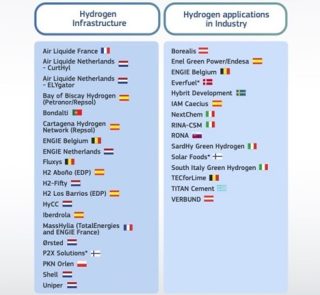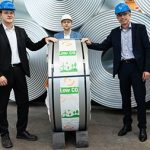-
EU approves €5.2 billion for IPCEI Hy2Use
Date posted:
-
-
-
Post Author
Greg Kelsall
-

Companies participating in IPCEI Hy2Use
The European Commission has approved an Important Project of Common European Interest (IPCEI) to support research and innovation, first industrial deployment and construction of relevant infrastructure in the hydrogen value chain. The project called Hy2Use was jointly prepared and notified by thirteen Member States: Austria, Belgium, Denmark, Finland, France, Greece, Italy, Netherlands, Poland, Portugal, Slovakia, Spain and Sweden.
The Member States will provide up to €5.2 billion in public funding, which is expected to unlock an additional €7 billion in private investments. As part of this, 29 companies with activities in one or more Member States, will participate in 35 projects.
IPCEI Hy2Use will cover a wide part of the hydrogen value chain by supporting:
- The construction of hydrogen-related infrastructure, notably large-scale electrolysers and transport infrastructure, for the production, storage and transport of renewable and low-carbon hydrogen
- The development of innovative and more sustainable technologies for integrating hydrogen into the industrial processes of multiple sectors, especially those that are more challenging to decarbonise, such as steel, cement and glass.
Several projects are expected to be implemented soon, with various large-scale electrolysers expected to be operational by 2024-2026 and many of the innovative technologies deployed by 2026-2027. The completion of the overall project is planned for 2036, with timelines varying in the function of the project and the companies involved.
Hot on the heels of this EU announcement, the first projects to receive the funding are already being announced, with the ones I have come across so far being:
- €194m goes to Maire Tecnimont’s subsidiary NextChem for the development of a waste-to-hydrogen plant. The project sets up the Hydrogen Valley of Rome, the first industrial-scale technological hub for the development of the entire national hydrogen supply chain. The waste-to-hydrogen plant is set to produce up to 20ktH2/year using 200kt/y of non-recyclable solid waste as raw material. The grant will be disbursed during the construction phases of the plant. The next steps concern the start of the project activities and all the necessary permits, in order to ensure the plant can start-up in the first half of 2027, in compliance with the funding. In the initial phase, a production of 1.5ktH2/y and 55kt/y of ethanol is expected. The European project also includes a contribution of approximately €4m for additional research and development activities in waste-to-hydrogen technology, leveraging scientific partners such as Enea, Fondazione Bruno Kessler and La Sapienza University of Rome.
- €1b for a German measure to help Salzgitter Flachstahl GmbH to decarbonise its steel production processes by using hydrogen, including renewable hydrogen produced on site, using a new production facility. The aid, which will take the form of a direct grant, will support the construction and installation at the company’s site in the city of Salzgitter, Lower Saxony of a direct reduction plant and electric arc furnace which will replace one of the blast furnaces currently operated by Salzgitter. The new installation will produce approximately 1.9 million tonnes per year of crude steel. The measure will also support the construction and installation of a 100 MW electrolyser which will produce approximately 9ktH2/y. The hydrogen produced by the electrolyser will be used as feedstock in the direct reduction plant. The electrolyser, the direct reduction plant and the electric arc furnace are envisaged to start operating in 2026.
- SardHy Green Hydrogen, the company established on the basis of a joint project of Enel Green Power and Saras for the development of green hydrogen in Sardinia. Formed as a result of the memorandum of understanding signed by the two companies in February 2021, the initiative is expected to see SardHy Green Hydrogen install a 20 MW electrolyser at the Sarroch industrial site in the province of Cagliari. The plant, described as being fuelled exclusively by renewable energy from Enel Green Power, will be used to produce green hydrogen for the Saras refinery with the aim of reducing the carbon footprint of its refining processes. The amount of funding is not disclosed but will be part of the €500m to be awarded to the four Italian companies who were accepted into the second IPCEI on hydrogen.
- €134m to support Germany’s BASF SE for the production of renewable hydrogen with the aim of decarbonising its chemical production processes and of promoting hydrogen in the transport sector. The aid will take the form of a direct grant to support the construction and installation of a large-scale electrolyser at BASF’s Ludwigshafen site. With an annual production capacity of 5ktH2/y and 40ktO2/y, the plant will start operating in 2025.

Green steel from Salzgitter
